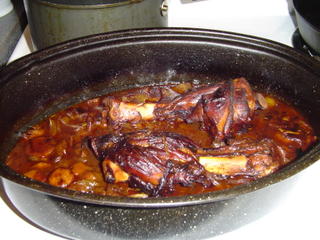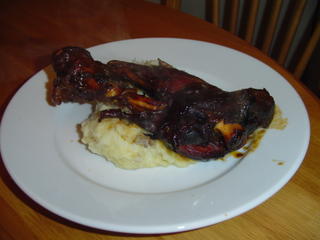I realize how absurd it is to wish for rain and cold in Newfoundland ... kind of like carrying the proverbial coals to Newcastle. But that's where my head was today, so I don't know what to tell you.
I'd been looking forward to doing this cooking all week ... I bought some lamb shanks a few days ago, and had an afternoon of braising in mind. Braising is currently my favourite form of cooking -- the long slow simmer over several hours that turns tough cuts of meat into fall-off-the-bone tender goodness. It's sort of the opposite of grilling; in grilling, it's all about the meat itself, the choicer the cut the better, and don't you dare cook it for a minute longer than is absolutely necessary. Braising on the other hand is more about the marinade and the liquid in which you simmer things ... and the longer you cook the meat the better. Not the strategy of cooking you want after a long day at work, when speed is of the essence -- but perfect for a lazy sunday, when you have nothing much else to do and the aromas from the oven permeate the home. It also solves that cooking conundrum wherein the tastiest cuts of meat are often the toughest (shanks, for example, or flank steak, or pot roast).
So this evening it was lamb shanks on the menu, a recipe I've devised in an attempt to replicate that frighteningly good lamd shank they serve at Ferrovia, a restaurant around the corner from my parents'. I'm close ... I think I need to get a pressure cooker to master it entirely, but I've managed a reasonable simulacrum of the original.
This recipe, I should add, is not for the impatient. The longer it cooks the better, and therefore should ideally be started no later than 4pm.
My own particular trick with braising (I do it with pot roast, too) is threefold: first, vinegar is your friend! In particular, basalmic or red wine vinegar adds an amazing tang to what might otherwise be a bland piece of meat. Second, make certain to sear the meat beforehand, ideally after it has either been marinating or dressed with a dry rub. And finally, always be sure that at least a third of the meat is exposed: do not submerge it entirely in the braising liquid, but let part of it get roasted and even slightly charred. About every half hour, turn the meat so the exposed section is immersed and another part is exposed. The roasting/simmering alternation adds an amazing texture.
So, yet another in the ongoing series of Chris' recipes (I think I missed the boat -- I should have a show on the food network).
BRAISED BASALMIC LAMB SHANKS
[Caveat: I don't work from exact measurements when it comes to spices &c ... what you have here is a rough approximation]
heat the oven to 400-450 degrees
2-4 lamb shanks (you can get them relatively cheaply frozen from Loblaws) rubbed with olice oil
1 cup red wine
2 cups vegetable stock

2 tbsp tomato paste
1/2 cup basalmic vinegar
5 garlic cloves, crushed
2 onions, diced
4 stalks celery, diced
4 carrots, peeled and diced
water to bring liquid to cover shanks 2/3
Dry rub:
1 tbsp rosemary, pulverized
1tbsp kosher salt
1 tsp basil
2 tsp fresh black pepper
Apply the dry rub to the lamb shanks.
OK, here's an optional part: for those pressed for time, take the pot / deep skillet / roasting pan / Dutch oven / etc. and put it on a burner on medium heat. Add olive oil. When oil is hot, sear shanks until golden. Remove shanks and add diced onions, carrots and celery (if you're cooking this meal to impress people, make a point of referring to this mixture as a mire foix) as well as the garlic. Sautee veggies until starting to brown and carmelize. Deglaze with red wine. Add the stock, tomato paste, and the vinegar. Bring to a simmer. Add the shanks, and pour in water until 2/3 of the shanks are covered. Bring again to a simmer. Cover, and let sit for 15-30 min. Remove from burner and place in the over. Cook for 2-3 hours, turning shanks every half hour as described above.
Alternative for those in no rush: toss the garlic, onions, celery and carrots in olive oil and crushed rosemary. place in the base of your roasting pan. Place the shanks with dry rub on top and roast in a 450 degree oven for one hour. Remove the shanks. Place the pan over a burner on medium heat and deglaze veggies with red wine. Follow instructions as they now merge with those above.
For those wanting to be very fancy, before applying the dry rub, cut slits in the shanks and insert slivers of garlic.
Serve with Chris' killer garlic mashed potatoes (recipe in a future post).

I tend to prefer the longer method (it's what I did tonight) because you get a much deeper and more complex level of flavours from the roasting. One way or another, it's a wonderful way to spend a sunday afternoon, especially if you've got a bottle of red wine and a good movie on TV. As things happened, Sense and Sensibility was playing ... I caught it about a third of the way in. One of those rare movies that manages the trifecta of acting (Alan Rickman, Emma Thompson, Kate Winslet), directing (Ang Lee) and writing (Jane Austen). All in all, a good way to spend a sunday, even if it didn't rain.

2 comments:
oh so were going to start trading menu's now too....is there anythign the internet wont give me.
stay tuned and ill throw up a mean recipe for tabouleh salad and a cilantro seared chicken.
that or a delicious apple and brie stuffed chicken..
its chicken night regardless
geez, I really need to start learning to cook.
Post a Comment